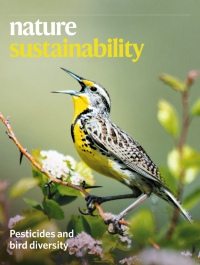Nature Sustainability Alert – December 2020
Volume 3 Issue 12, December 2020

Pesticides and bird diversity
Neonicotinoid pesticides are used widely, raising concerns about effects on organisms besides pests. Khanna and colleagues find that increased neonicotinoid use in the continental United States has reduced bird diversity, especially that of grassland and insectivorous birds.
See Li et al.
Image: Image courtesy of Wenfei Tong. Cover design: Valentina Monaco.
Editorial
-
Editorial | 10 December 2020
Bundling agri-food innovations
Our expert panel on food value chains now shares recommendations on how to transform agri-food systems.
Comment & Opinion
Comment | 10 December 2020
Bundling innovations to transform agri-food systems
Coupling technological advances with sociocultural and policy changes can transform agri-food systems to address pressing climate, economic, environmental, health and social challenges. An international expert panel reports on options to induce contextualized combinations of innovations that can balance multiple goals.
- Christopher B. Barrett
- Tim G. Benton
- & Stephen Wood
Comment | 16 September 2020
Seeing COVID-19 through an urban lens
Pandemic responses can engender healthier and more sustainable societies only if we attend to urban equality.
- Michele Acuto
- Shaun Larcom
- & Susan Parnell
Q&A | 10 August 2020
Lessons learned in Africa
Michael Norton, from the European Academies Science Advisory Council, and Baldwyn Torto, from the International Centre of Insect Physiology and Ecology, talk with Nature Sustainability about recent efforts to address neonicotinoid insecticide risks in Africa.
- William R. Burnside
Reviews
-
Review Article | 19 August 2020
Rethinking wastewater risks and monitoring in light of the COVID-19 pandemic
Converging evidence indicates that SARS-CoVs are present in wastewater for several days with potential health risks. This Review analyses knowledge about such risks as well as the potential spread of SARS-CoVs in waterborne, waterborne–aerosolized and waterborne–foodborne pathways during a pandemic.
- Anne Bogler
- Aaron Packman
- & Edo Bar-Zeev
Collection:
Review Article | 14 September 2020
Microbial deterioration and sustainable conservation of stone monuments and buildings
Biodeterioration of stone monuments and buildings can lead to a loss of world cultural heritage. This Review discusses the role of microbes in the deterioration processes, the biochemical mechanisms involved and possible strategies for sustainable conservation of stone monuments and buildings.
- Xiaobo Liu
- Robert J. Koestler
- & Ji-Dong Gu
Research
-
Article | 07 July 2020
The short-term impacts of COVID-19 lockdown on urban air pollution in China
Urban air quality remained remarkably worse than WHO recommended levels in cities during the first COVID-19 lockdown in China, despite substantial pollution reductions and the high costs of the measure.
- Guojun He
- Yuhang Pan
- & Takanao Tanaka
Article | 24 August 2020
Grand theft water and the calculus of compliance
Water use may be a topic of increased research, but water theft remains understudied. This paper utilizes insights from three international case studies to inform on the systemic failures that sustain water theft.
- A. Loch
- C. D. Pérez-Blanco
- & C. Seidl
Article | 18 May 2020
Impacts of a large-scale titling initiative on deforestation in the Brazilian Amazon
A large-scale land-titling programme in the Brazilian Amazon did not affect forest cover in large landholdings, but induced deforestation in the small and medium ones, driven by crop and cattle price increases.
- Benedict Probst
- Ariel BenYishay
- & Tiago N. P. dos Reis
Article | 10 August 2020
Neonicotinoids and decline in bird biodiversity in the United States
Neonicotinoid insecticides have the potential to harm non-target organisms. This study finds that, between 2008 and 2014, increased neonicotinoid use in the United States reduced bird diversity, especially grassland and insectivorous birds.
- Yijia Li
- Ruiqing Miao
- & Madhu Khanna
Article | 20 July 2020
Reduced ecosystem services of desert plants from ground-mounted solar energy development
Although deserts have been the focus of large-scale solar power development, this study finds that ecosystem services are degraded during such development, with impacts not only on plants and animals, but indigenous peoples as well.
- Steven M. Grodsky
- & Rebecca R. Hernandez
Article | 03 August 2020
Sustainable lead management in halide perovskite solar cells
The most-efficient solar cells use Pb-based halide perovskites; however, their toxicity poses environmental and health risks. Here, the authors report an adsorbent that allows for sustainable Pb management in these devices.
- So Yeon Park
- Ji-Sang Park
- & Hyun Suk Jung
Article | 10 August 2020
A sunlight-responsive metal–organic framework system for sustainable water desalination
Light-responsive smart materials hold promise for a solution to water desalination. Here the authors report an adsorbent based on a metal–organic framework that quickly adsorbs multiple ions from water in the dark, followed by release of these salts on exposure to sunlight.
- Ranwen Ou
- Huacheng Zhang
- & Huanting Wang
Article | 10 August 2020
Rational design of perfluorocarbon-free oleophobic textiles
Perfluorochemicals render fabrics water and oil repellent; however, their use poses environmental and health risks. Here, the authors show the rational design of textile finishes with excellent oil repellency without adopting any perfluorinated substances.
- Sadaf Shabanian
- Behrooz Khatir
- & Kevin Golovin
Amendments & Corrections
-
Author Correction | 29 October 2020
Author Correction: A scoping review of research funding for small-scale farmers in water scarce regions
- Vincent Ricciardi
- Abdrahmane Wane
- & Zia Mehrabi
Author Correction | 06 November 2020
Author Correction: Water and sanitation for all in a pandemic
- David M. Hannah
- Iseult Lynch
- & Stefan Krause


No Comment